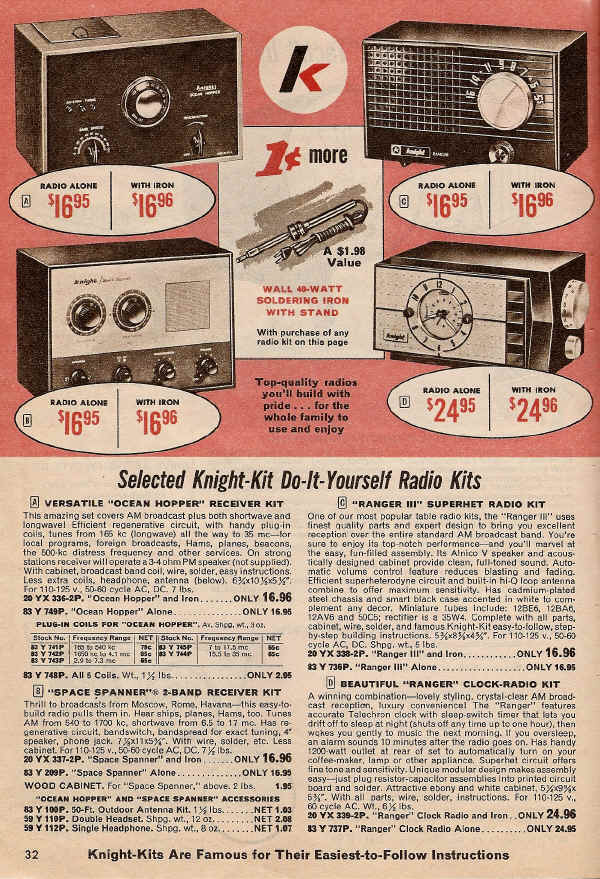Welcome to Handiham World.
Change is in the wind.

I'm looking at a page from a 1968 Allied Radio Knight-Kit
catalog, and reminding myself what it was like in the heyday of short-wave
listening. The "Ocean Hopper" said it all right in its name, which
conjured up dreams of far-off places around the globe. On the same page
there is the "Space Spanner" 2-band receiver kit, which would let you "thrill to
broadcasts from Moscow, Rome, and Havana".
Yes, those were heady days for a young guy who just got his
General Class license. Like many ham radio enthusiasts of the day I had
begun my exploration of the science and art of electronics by listening to the
radio. First it was AM broadcast, which I discovered would serve up
distant stations late at night. We had an old RCA Victor radio, and I
discovered that it had something called "short-wave". After figuring out
that there was a place to connect a wire antenna I discovered that there was an
entirely new world of radio out there, and one didn't need to stay up late into
the night to hear stations from around the world! Back then, all nations
considered having an official short-wave service a necessity, and if they could
afford to set one up, they did. Havana put a stout signal into cold,
wintery Minnesota and made me think about palm trees and Caribbean beaches.
Radio Moscow had an air of dangerous intrigue - a propaganda outlet for
Communism, for heaven's sake! The BBC was a stalwart, highbrow source for
world news.
When I visited the ARRL website, as I do every day, I spotted
a story about good old short-wave listening:
Voice of Russia — former “Radio Moscow” — to End Shortwave Broadcasts.
Yes, another international service has bitten the dust. Not, mind you,
that I would have even noticed had it not been for the ARRL story. Like
most of us, I get my news and information from many different sources, all of
which have access to world-wide stories. The Internet has made world-wide
communication so ubiquitous that I rarely even stop to consider that it's the
reason I actually listen more to the BBC now than I did back in the days of
short-wave. The BBC is carried on my local public radio service, Minnesota
Public Radio, and is available as an Internet stream as well as on the FM
broadcast band. Unlike the Ocean Hopper, my FM radios and my Grace WI-FI
radio serve up a perfect signal anytime without regard to the vagaries of
short-wave propagation.
Is this good? Or bad?
I guess the only answer is "yes" because it is really both.
It's good to have more reliable, clear reception. It is there when I want
to listen, and I don't have to put up with fading and interference. On the other
hand, Internet-dependent radio is also a potentially brittle technological
confabulation, mostly reliable and getting more so, but still potentially
breakable. It's just that there are so many points at which the break can
happen:
-
Your home network could fail or reassign IP addresses, interrupting connectivity.
-
Your ISP could experience an outage for many reasons - equipment failure, overload, or damage to infrastructure, such as when a fiber optic cable gets cut by an excavating crew or storm damage cuts an overhead cable or topples a tower.
-
Bad guys could mount an attack on a web service, interrupting streaming.
-
A government could deem a service to be undesirable and block it. So could an employer, if you listen at work.
-
A computer problem at your own PC could disrupt streaming. We all know that our home computers are complicated and depend on hardware and software dancing together perfectly!
Short of losing power or having a solar storm, short-wave is
going to be there for you. It's simpler and therefore less "brittle", and
less likely to break. In fact, the same thing is true for Amateur Radio in
general, assuming that the Internet is not a link in a radio system. This
ability to stand alone without complicated infrastructure is one of our
features!
But, as we suggested, change is in the wind. Short-wave
broadcasting has been declining in importance for a long time, and the world has
become increasingly dependent on Internet communications. To me, that makes
our unique ability to carry on standalone communications even more valuable!
If the power goes down, I can get going again on emergency power. I can't
say the same thing about an Internet outage. I like the Internet and use
if for lots of things, even ham radio applications like logging, remote base
operation, and VoIP services like Echolink and IRLP. But here's the thing:
I may embrace the changes that made these services possible, but I have not -
and will not - forget about short-wave and its unique advantages. I'll
enjoy the BBC on an Internet radio, but I won't set aside my HF station.
You just never know when you'll need to "ocean hop" without a
smartphone or computer.
Patrick Tice, WA0TDA
Courage Kenny Handiham Coordinator
Read or listen to the entire newsletter this week.
Courage Kenny Handiham Coordinator
Read or listen to the entire newsletter this week.